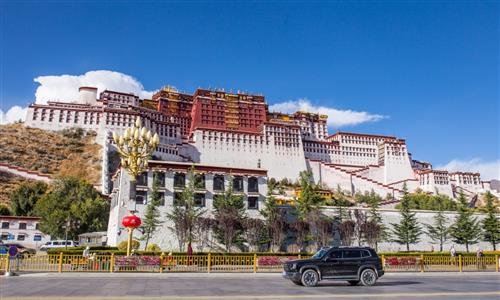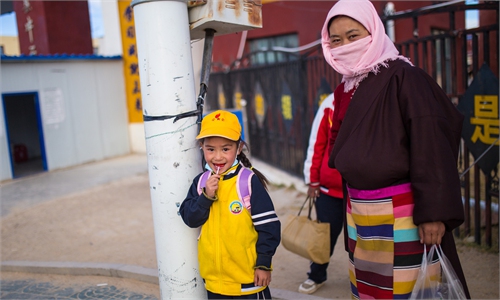IN-DEPTH / IN-DEPTH
Xizang in the New Era: GT’s exclusive visit to Xizang’s Cona after its upgrade from county to city
Guarding the border
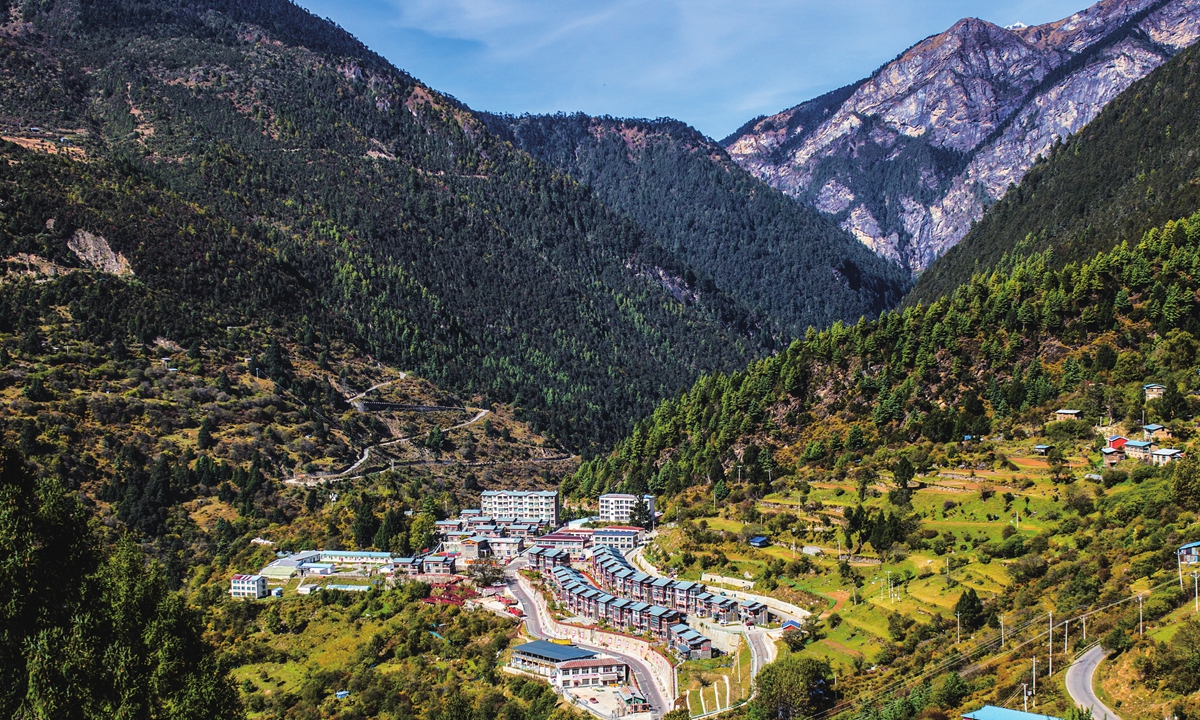
A border village in Cona, Southwest China's Xizang Autonomous Region Photo:
In April, Cona, located in the southeastern part of Southwest China's Xizang Autonomous Region, upgraded from a county to a city, attracting domestic and international attention.
This strategically important city, bordering Bhutan to the west and India to the south, once witnessed great battles to protect the homeland. Today, the spirit of defending the border and the land is carried forward through consolidation and development.
Global Times reporters recently visited the upgraded Cona city, experiencing the vigorous vitality of border construction and the peaceful atmosphere brought by enriching and securing the border area.
In conversations with locals, Global Times reporters deeply felt that under the guidance of the important strategic measures for governing and stabilizing Xizang, Cona is not only the frontline in the fight against encroachment, but also the main battlefield for rural revitalization. "Strive to be the guardians of this sacred territory and builders of a happy homeland" is the common line of thought of the more than 15,000 people of various ethnic groups who live here.
Enhanced border-area consolidation
Lebugou, located in the southern part of Cona city, was the main battlefield of China's defensive counterattack against India in 1962. The site of the frontline command post of General Zhang Guohua, the then-commander of the Xizang Military Command, is still preserved here. In 2021, this site was included among the national "red tourism" routes and named as a patriotic education base in southeastern Xizang region.
Today, the Monpa ethnic group living here continues to uphold this red spirit through their actions.
"The land under our feet was secured by the blood of our soldiers, and I will guard it during my border patrols," 52-year-old Kelzang Tenzin firmly stated.
Kelzang Tenzin has been guarding the border for over 30 years. Now, he also serves as the deputy secretary of the Le Monpa Ethnic Township Party Committee and chairman of the local People's Congress.
He recalled that patrolling and guarding the border has been a tradition passed down through generations among the Monpa people of Lebugou, a major habitation for people of Monpa ethnic group.
He started patrolling the border due to the influence of his father, Tsering Tenzin, who was one of the first border guards in Lebugou after the founding of New China.
"I began to learn border patrolling skills and knowledge while herding with my father at the age of 13. 'You must guard every inch of the motherland!' This was what my father repeatedly emphasized," he said.
"Under his influence, I realized that I not only needed to know the names of the mountains and rivers here, but also had to pass this knowledge to the younger generation," he noted.
He mentioned that during routine patrols, apart from encountering wild beasts and snakes, they also found tree branches or stones painted with foreign flags in the jungle.
"Whenever we see these signs of infringement on our sovereignty, we scrape off the tree bark or paint over the stones, then redraw the Chinese flag on them. This is our territory, and we do not allow others to leave any marks," he said.
Kelzang Tenzin proudly stated that Lebugou's border patrols would carve "China" into cliffs and boulders, paint the map of the motherland, depict the pattern of the five-starred red flag in the dense forests, or place stones in the shape of the national flag. "This is how we measure and mark the motherland's territory."
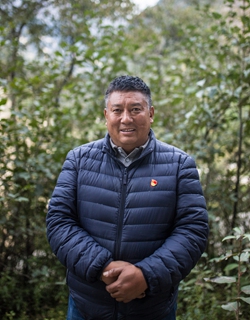
Kelzang Tenzin has been guarding the border for over 30 years. Now, he also serves as the deputy secretary of the Le Monpa Ethnic Township Party Committee and chairman of the local People's Congress.
Photo: Shan Jie/GT
Kelzang Tenzin's daughter, Tsering Wangmo, returned to Lebugou after graduating from university in recent years, joining the border patrols out of her deep affection for her hometown.
Inspired by three generations of her family's dedication to border patrols, more and more locals in Lebugou have responded to the call, joining the patrols and sharing the sacred mission of protecting their homes and defending China's territory.
Apart from the locals of Lebugou, more and more people from other areas are also choosing to come to Cona to undertake the important task of the consolidation of border areas. Tenzin Ngodrup, a 29-year-old "new resident" of Cona city, moved here not long ago with his family of six from Naixi town, Comai county of Shannan Prefecture, where the average altitude is above 4,200 meters and natural conditions are relatively harsh.
"Before coming here, I sold all our cattle and sheep at home, but I am not worried about life here," Tenzin Ngodrup told the Global Times. In Cona, he and his family have a place to live, his children have schools to attend, and he receives subsidies, all of which reaffirm his determination to settle in the border area.
"We are here to guard the border," he said.
What inspires Kelzang Tenzin not only is the growth of Cona's border patrol team, but also the significant investments made by the Party and the government in border area infrastructure in recent years.
According to Kelzang Tenzin, years ago, patrolling was extremely difficult. A single patrol mission could take an entire week, and they had to endure the elements outdoors, with encounters with wild animals like wild boars, leopards, bears, and snakes being common.
However, with the development of the times, technological progress, and government investment, the conditions for border patrols have significantly improved.
"Currently, nearly half of the patrolling routes are connected by roads, and even in the vast forests, mobile phone signals are available. All these changes have brought great convenience and safety to our border patrol tasks," said Kelzang Tenzin.
The transformation of Lebugou is a microcosm of the Xizang region's efforts to strengthen border infrastructure.
At the press conference for China's newly released white paper titled CPC Policies on the Governance of Xizang in the New Era: Approach and Achievements held on November 10, Chairman of the government of Xizang Autonomous Region Yan Jinhai introduced that since the New Era, Xizang has adhered to the strategic concept of "To govern the country, one must govern the borders; to stabilize the borders, one must first stabilize Xizang," presenting a new look for fortified borders and peaceful frontiers.
"All border counties in Xizang are connected by asphalt roads, all border townships and administrative villages by main power grids, and the coverage rates of broadband and 4G signals in administrative villages have reached 100 percent. People of all ethnic groups are rooted in the snow-covered border areas like vibrant Gesang flowers," Yan said.
Broader prospects for development
In April, after the upgrade, the seat of the Cona city government was moved from the original Cona county town southward to Mama Monpa Ethnic Township. Half a year since this decision, surveying, planning, construction, and relocation efforts have been put on the agenda. Local people are full of expectations for the accelerated construction of the new Cona.
"On the south side of the Mama township government building, there is a flat wasteland where the new government building of Cona city will be constructed," Thubten Tsering, head of Mama township, told the Global Times. "The township's hospital, school, kindergarten, and other infrastructure projects are already in the planning and construction stages. And the best land will be reserved for the students."
According to the overall plan of Mama township, like the other 20 border counties (cities) in Xizang, it will be equipped with cultural and sports venues, standardized water supply plants and landfill sites that will provide hardware support for border development.
The upgrade will inevitably elevate the overall development of Cona city, which has been seen as a great business opportunity by those engaged in commerce here.
"Before the upgrade, business in Mama town was good, with customers every day, and even more tourists during the summer and National Day holidays," said Zeng Yan, the owner of a Sichuan restaurant in Mama town. She said that business in Mama town will be even better after the upgrade.
Currently, the township has only about 300 permanent residents, but in the future, tens of thousands of people may pour in.
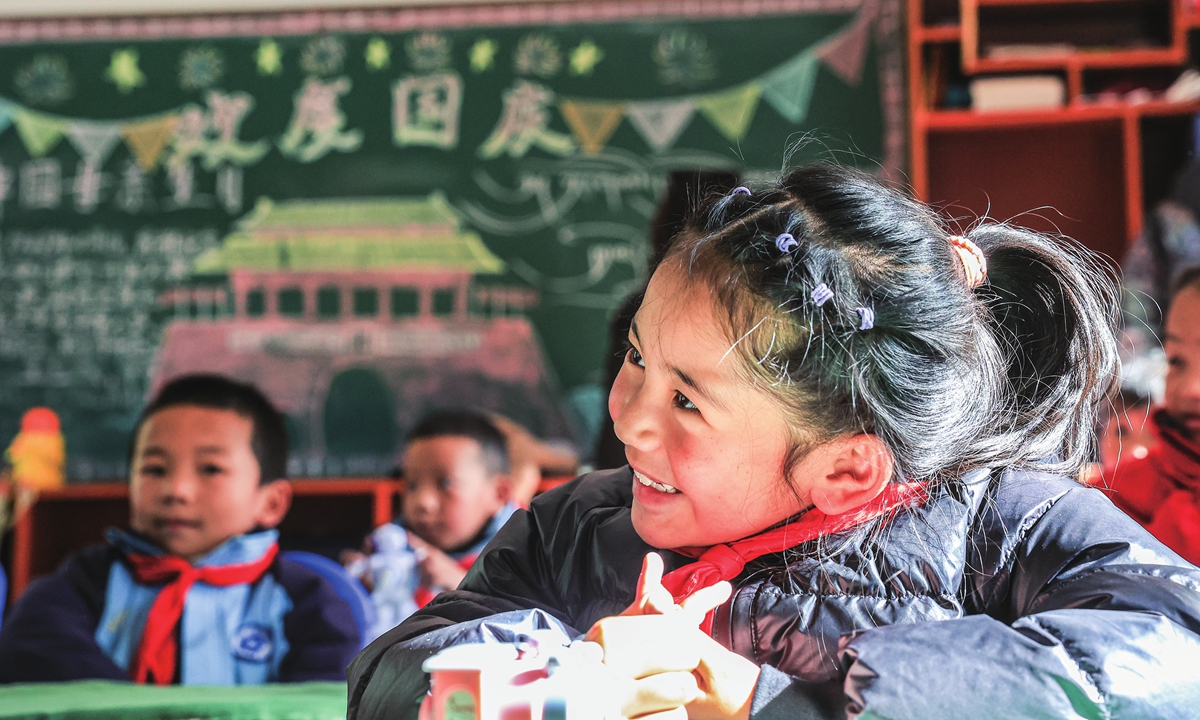
A student in the primary school of Lebugou, Cona city Photo: Yang Ruoyu/GT
The anticipated influx of people has led to a surge in rent prices in Mama town. Some shops in the township have seen rent double since the upgrade from county to city status.Zeng stated that even with the increased rent, she does not plan to give up her business here and even plans to relocate her initially remote store to a more populous area. In her view, Cona has rich tourism resources.
"In the long term, this place is suitable for long-term development, not only for its beautiful scenery but also for its ample oxygen. The local residents are very simple, and we have become friends in the process of interacting with the villagers. I have been here for two years and plan to stay for the foreseeable future," Zeng told the Global Times.
Cona city is indeed renowned for its beautiful scenery and abundant tourism resources. The journey from Shannan to Cona, increasingly popular for self-driving tours, offers visitors picturesque landscapes. Along the way, one may encounter attractions like the Tombs of Tibetan King, the Drigu Grasslands, Nariyongcuo Lake, and wild animals like kiangs, or the Tibetan wild ass.
Since 2011, Cona has prioritized tourism as its pillar industry, investing heavily in developing tourist resources within Lebugou. With the support of the border development strategy, Cona city has almost completed its road network to major scenic areas, with complete basic facilities like water, electricity, roads, telecommunications, and the internet meeting tourists' basic needs and transforming tourism resources into economic advantages.
"Lots of tourism resources in Cona city, especially in Lebugou and Quchomo townships, are distributed along the Niangmu River. They have great potential and high development," Liu Jie, Head of Cona Tourism Development Bureau, told the Global Times.
Cona is actively responding to Xizang's series of plans for border development, integrating Cona into national and regional major tourism circuits. The city is collaborating with border counties and cities like Lhunze for collective development and planning border tourism circuits, allowing visitors to experience the spirit of border defense and patriotism, according to Liu.
Maintaining and energizing border areas and developing unique industries like cultural tourism in these areas are crucial steps in Xizang's efforts to create a national model region for border development, and they have seen significant results.
Since the 18th National Congress of the Communist Party of China in 2012, the economic growth rate of Xizang's border counties has exceeded the regional average.
In the past five years, the registered population of the border areas in Xizang has increased by 10.5 percent, according to the government work report of Xizang region in 2023.
The report also proposed prioritizing policies, projects, and funds for the border frontlines to achieve stability, prosperity, and wealth for border residents and to advance Xizang's border development efforts to the forefront nationwide.
Promising life in frontier
With the completion of the well-off village construction, Cona, known for its rich tourism resources and beautiful scenery, has developed farmhouse B&B industry. The enthusiasm of Cona city residents for participating in the tourism industry has further increased, highlighting the impact of the increasing wealth brought by the rapid development of border areas.
Lebugou, with its low altitude, rich vegetation, and warm and humid climate, has been designated as "China's Natural Oxygen Bar" by the China Meteorological Service Association, attracting many tourists in Xizang and other parts of China.
Thanks to policy and financial support from the central and local governments of Xizang for border village construction in recent years, Mama township began building new houses with modern facilities in 2014.
Besides residences, many villagers are providing farmhouse B&B service. Thubten Tsering introduced that there are currently 105 households with 315 people in Mama town and farmhouse B&B has become one of their main sources of income. Currently, there are about 86 farmhouses with 667 beds in the township, typically priced at 150 yuan ($20) one day per bed.
"During holidays, beds involved in Lebugou farmhouse B&B become particularly scarce, sometimes forcing tourists to sleep on sofas in the living room," Thubten Tsering said.
Sonam Yangjen, a resident of Mama town, is one of these residents that provide farmhouse B&B service. Her home not only had ethnic charm but also thoughtful service: The living room was furnished with exquisitely carved Tibetan wooden furniture, and shelves displayed Monpa wooden bowls made by her father, an intangible cultural heritage inheritor. The table was set with candy and various drinks for guests.
"In 2015, our family moved into this new two-story house funded by the government. Like others, we also started to provide farmhouse B&B service. If a tour group comes to Lebugou, the tourism department arranges for them to stay with us. We earn 2,000 to 3,000 yuan a year from the service," Sonam Yangjen told the Global Times.
In addition, Sonam Yangjen also joins in tea planting, processing, and sales. The rapid development of the border area has also brought job opportunities to her husband in the construction industry. Like others, Sonam Yangjen's family enjoys various government subsidies such as border resident subsidies, border guard subsidies, and grassland subsidies.
"When I was young, there was nothing here, and the houses were empty. I never thought my hometown could develop like this. Now, my husband and I each have a car," Sonam Yangjen said with a smile.
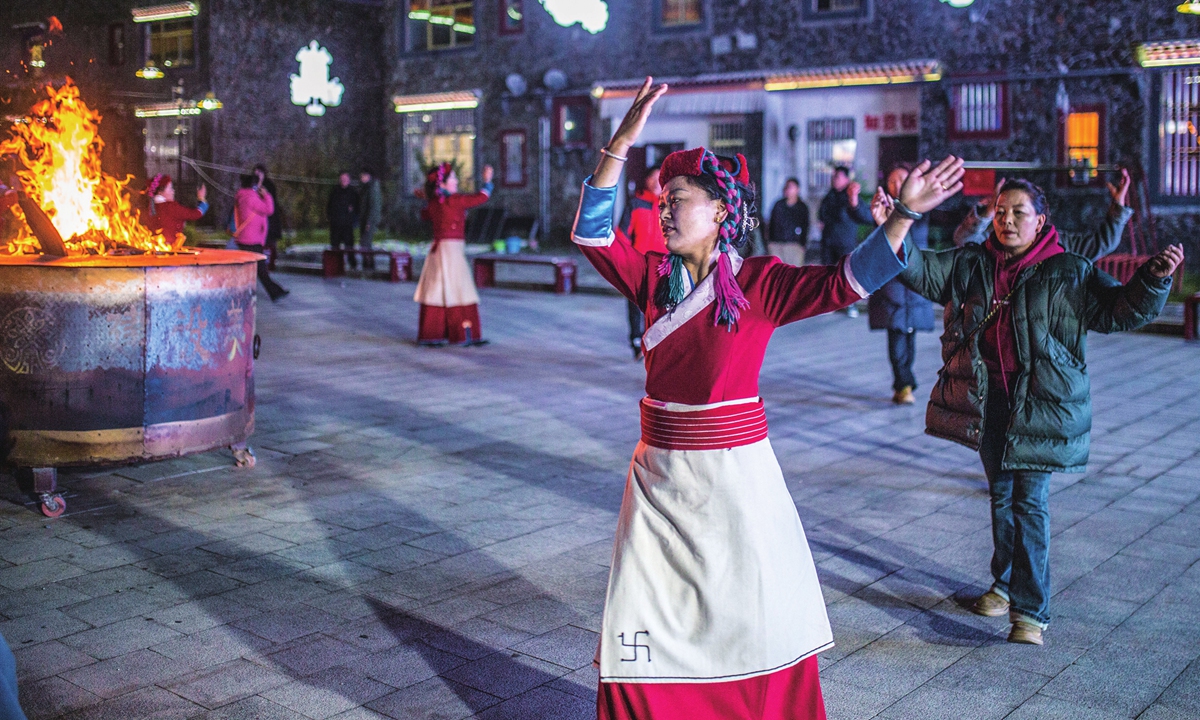
Sonam Yangjen, a resident of Mama township of Cona, dances with her friends on October 23, 2023. Photo: Shan Jie/GT
Currently, the per capita income of residents in Mama town has reached over 24,000 yuan, and the stable and substantial income has further strengthened the local people's determination and efforts in border maintenance.
"Patrolling and guarding the border is our sacred mission and duty. The care and support from the government have made our lives more prosperous and everyone's enthusiasm for patrolling and guarding the border is higher, and their vigor is stronger," Kelzang Tenzin told the Global Times.
In addition to leading villagers in border patrolling and guarding, Kelzang Tenzin also pays special attention to the industrial development of his township, exploring ways to increase villagers' income through rural economic development, providing them opportunities to become wealthy at their doorstep.
"Our town's natural conditions are suitable for growing high-altitude tea. Under the guidance and support of the government, we established a tea cooperative, and have already built an industry chain of planting, processing, and sales. This industry has brought significant income growth to villagers, with the tea industry alone increasing their income by more than 10,000 yuan annually. In addition, we have developed the tourism industry. By 2021, the per capita income of farmers in the township reached 26,000 yuan," Kelzang Tenzin said.
Despite being on the frontlines of border defense, local residents are generally very optimistic about the development prospects of Cona city. The upgrade from county to city is seen as further aiding Cona's strategy of border development and wealth creation.
"The upgrade from county to city makes me feel that the country values our hometown's development more. I hope more people can come to Cona," Sonam Yangjen told the Global Times. "People say life in remote border areas is hard, but I do not feel hard. I feel very happy."


